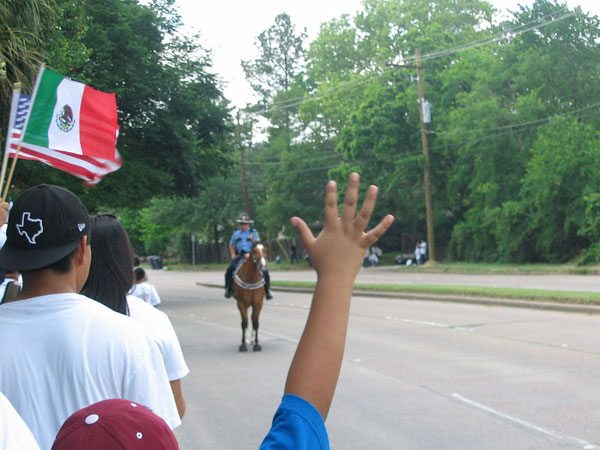
September 26, 2017; MinnPost
Immigrant communities in general have a fear of police interactions, but this fear has been heightened in the current climate of crackdowns on immigration and increased raids from US Immigration and Customs Enforcement (ICE). Many worried that the increase in raids and deportations would lead to a decrease in crimes reported in these communities, and recent statistics have unfortunately proven this true.
In Houston, a community dominated by Latinx immigrants, NPR reports that according to Houston Police Department data, sexual assault reports from the Latinx community dropped nearly 43 percent in the first three months of this year compared to last year. The number of Latinx-reported robberies and aggravated assaults are each down 12 percent. And Houston is not alone with this trend. In Los Angeles, Police Chief Charlie Beck says reports of sexual assault this year have dropped 25 percent among the city’s Latinx population compared to the same period last year.
A study of hundreds of victim advocates and legal service providers in 46 states (and D.C.) finds that immigrants are afraid to call police, to press charges, or to testify at trial because ICE is making arrests at courthouses. In one prime example, a woman coming to a Texas court to testify in a domestic violence case was arrested by ICE agents, who had likely been tipped off by her alleged abuser. She was seeking a protective order against her former live-in boyfriend, whom she accused of punching, kicking, and choking her, pulling her hair, and attempting to stab her. A victim’s advocate from the Center Against Sexual and Family Violence, a shelter for victims of domestic abuse where she was living, had driven her to the courthouse. El Paso County Attorney Jo Anne Bernal told the Washington Post, “It really was a stunning event. It has an incredible chilling effect for all undocumented victims of any crime in our community.”
Sign up for our free newsletters
Subscribe to NPQ's newsletters to have our top stories delivered directly to your inbox.
By signing up, you agree to our privacy policy and terms of use, and to receive messages from NPQ and our partners.
But some communities are actively taking steps to make immigrants feel safe in their interactions with the police, despite the recent uptick in ICE arrests and deportations.
- In Minneapolis, a nonprofit organization called Language Central is offering Spanish language education to the local police department in a special class targeted to make police interactions with immigrants easier. The class known as Spanish for Police Officers, or SPO, is designed to help members of law enforcement better communicate with the immigrant community. The accelerated Spanish program is meant to give police officers and security personnel the skills necessary to give commands, gather information, and give proper help in Spanish. “I want my students to feel very comfortable understanding and speaking Spanish,” said Paul Garcia, the instructor of the class. “The focus of this class is to make sure that officers can connect and communicate well with Spanish speakers.”
- The Indianapolis Star reported back in March on a police chief who walked his old beat to reassure the neighborhood with a large Latinx population that local officers don’t work with federal immigration authorities or ask questions about immigration status when responding to an incident.
- In Illinois, Senate Bill 31, or the TRUST ACT, prevents local law enforcement from acting as ICE agents. Under the bill, local police cannot stop, search, and arrest anyone based on immigration status unless there is a court-issued warrant. Supporters of the bill say this will prevent racial profiling and encourage immigrants to report crimes without the fear of retribution. Governor Rauner signed the bill into law on August 28th.
- In Durham, N.C., police are doing community events with local churches that serve immigrant communities.
- In central Wisconsin, the Portage County sheriff’s department is reaching out to immigrants to make sure that lines of communication stay open. Sheriff Mike Lukas told USA Today, “We want them [immigrants] to feel safe and secure in the county.”
- And in Clarkston, a small Georgia town outside metro Atlanta that has welcomed over 40,000 refugees in the last 20 years, the Coalition of Refugee Services Agencies sponsored an event in May called Coffee with a Cop to let Clarkston’s immigrant and refugee communities meet with police officers face-to-face and ask questions about their relationship to ICE, diversity in the city and on the force, and whatever else might be on their minds.
And the Vera Institute of Justice, a nonprofit whose mission is to drive change and urgently build and improve justice systems that ensure fairness, promote safety, and strengthen communities, has increased its focus on building bridges between police and Arab, Middle Eastern, Muslim, and South Asian communities. They train police in using the U-visa, a safety net for immigrant crime victims that cooperate with police. They also publish guidebooks written by police, for police in how to build trusting relationships with diverse communities.
So even with the recent increased deportations under the Trump administration, communities are banding together to build bridges and make immigrants feel safe. Police Chief Duane Hampton summed it up perfectly at an event in July in Hillsborough, North Carolina at Holy Family Catholic Church, held to build bridges between police and immigrant residents: “You should not have to live in fear.”—Alexis Buchanan












